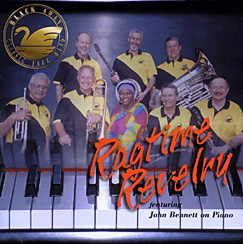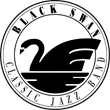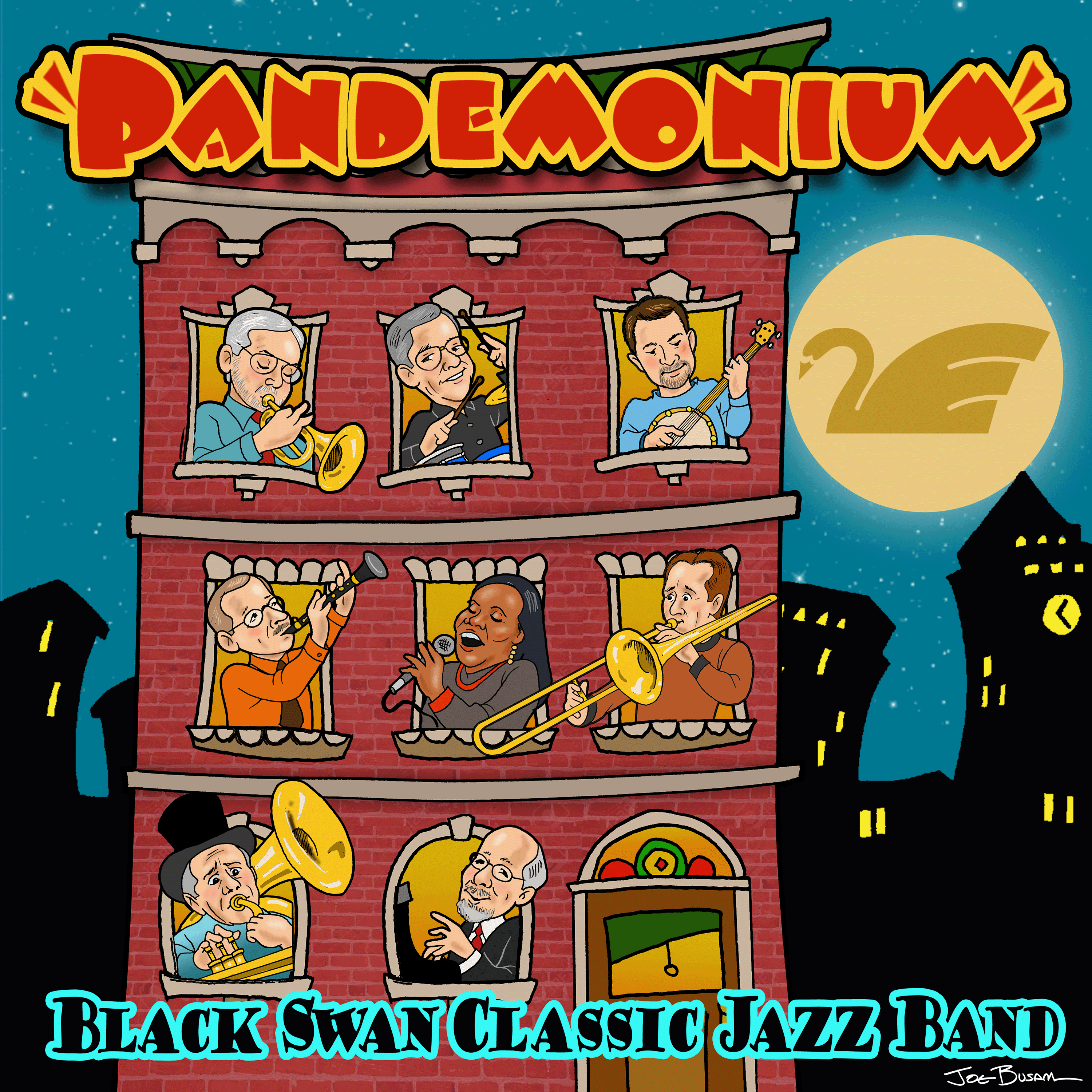Ragtime Revelry
 Ragtime Revelry was recorded in Portland, Oregon summer 2003. This recording features a varied selection of ragtime, primarily from the late 1890s through the 1920's.
Ragtime Revelry was recorded in Portland, Oregon summer 2003. This recording features a varied selection of ragtime, primarily from the late 1890s through the 1920's.
The musicians on this recording are as follows:
- Marilyn Keller, Vocalist
- Ernie Carbajal, Trumpet
- John Bennett, Piano
- Steve Matthes, Clarinet
- Ron Leach, Drums
- Alan Phillips, Banjo, Vocal
- Lew Chapman, Trombone
- Kit Johnson, Tuba
Buy this Album Online
| Ragtime Revelry (CD) | $16.00 |
Liner Notes
The original liner notes read as follows:
Ragtime Revelry
Ragtime was America's popular music in the early years of the last century. And rightly so. As a blend of African and American cultures, it was melodic, catchy, and its syncopated rhythms made it irresistible.
With the exception of a brief infatuation with the novelty rags of the 1920s, the ragtime craze was pretty much over by the end of World War I. Tin Pan Alley, with its Irving Berlins, was more interested in music with lyrics. The Gershwins were writing for Broadway, and musicians themselves were moving into jazz ensembles and performances. Although an occasional pianist still took on "The Maple Leaf Rag," the music lay mostly forgotten for two generations.
This changed in the 1970s with Joshua Rifkin's Joplin recordings, Max Morath's one-man shows on "Living the Ragtime Life," and the release of the film "The Sting," which drew heavily on Joplin's music. Ragtime was back.
The Black Swan Classic Jazz Band has included rags in previous recordings, but this is the first one devoted entirely to this era. Joplin , of course, is well represented here. His blockbuster hit of 1899, "The Maple Leaf Rag," although not the first rag written, set off the craze for ragtime that would last a full generation. We include also his "Chrysanthemum," "Bethena," a syncopated waltz, and "Ragtime Dance," written as a folk ballet with lyrics, but which didn't enjoy commercial success until revised as a piano feature, minus the 32 bars of verse. We have included the verse here, with its charming depiction of an evening spent dancing. One of Joplin 's more pensive works, "Solace," is here as well.
"The Dill Pickles" was the next big hit after "Maple Leaf." In fact, it was Tin Pan Alley's first million-dollar seller. This was followed by "Black and White Rag," another best seller, which used the same rhythmic pattern, one known as "three over four," a ragtime cliché that the public never tired of.
Two of our pieces could rightly be called cakewalks, a similar composition but still highly syncopated. These are "Creole Belles" and "The Mississippi Rag," the latter a depiction of the approach of a riverboat, the docking and attendant bustle, and then its departure and eventual disappearance around the bend.
As ragtime was a central feature of the St. Louis World's Fair of 1904, we include Turpin's celebration of that event, his "St. Louis Rag." Also here are "Wild Cherries," another million-copy seller. The middle years of ragtime saw the publication of the humorous "Barnyard Rag" and "The Red Rose Rag." Tin Pan Alley had discovered that adding lyrics to ragtime could produce monetary benefits. We include the "Junkman Rag" by Lucky Roberts. He had been a teacher of James P. Johnson and George Gershwin. This rag has been called one of the most joyous romps in ragtime literature. Eubie Blake's " Chevy Chase " is here. This is not one of his more difficult rags, as he was writing now for the song plugger at the five-and-dime store demonstrating the latest sheet music. Louis Armstrong's "Weatherbird Rag" is probably one of the least known rags here. We hope to help change that.
Finally, we include two compositions that are not strictly rags but are related. Lecuona's "La Comparsa" is an Afro-Cuban dance, celebrating a Mardi Gras procession. Ron Leach provides an authentic Cuban rhythmic accompaniment. And James P. Johnson's "Mule Walk" is a stride piece, a lovable first cousin to ragtime.
You'll especially enjoy the rags with lyrics. Marilyn Keller and Alan Phillips are vocalists of exceptional quality, whose renditions capture the spirit and warmth of these songs.
John Stark, the publisher of much of Scott Joplin, said, "These songs will add materially to the gaiety of nations." So be gay, er, enjoy.
John Bennett
August 2003
A note on John Bennett
John's first musical experience was playing the bones in an underground haunt in Rome called The Catacombs. His talent lay buried for years. But with his smash hit, 'The Shriek of Araby', he was able to tunnel his way to success. "The band down there was to die for," John recalls. "Some of those stiffs got totally wrapped up in their music. One guy named Adam, I think, liked to jam on 'Struttin' With Some Barbecue.' But he was about one rib short of a barbecue, and they had to let him go. Another guy liked to play the footbones," John reminisces, "but he kept skipping beats. His cousin played the tail bones. That guy always got a little behind." John eventually switched to piano, and now when he tinkles on the ivories, there's hardly a dry seat left in the house.
Music
- Weatherbird Rag. Louis Armstrong; Arr. Kit Johnson...[4’16”]
- The Ragtime Dance. Scott Joplin; Arr. John Bennett; Vocal, Marilyn Keller... [4’10”]
- Maple Leaf Rag. Scott Joplin; Arr. John Bennett... [2’39”]
- St. Louis Rag. Thomas Turpin; Arr. John Bennett... [3’21”]
- Creole Belle(s). J. Bodewalt Lampe; Arr. Kit Johnson; Vocal, Alan Phillips... [5’08”]
- Chrysanthemum. Scott Joplin; Arr. John Bennett... [3’32”]
- Mississippi Rag. William Krell; Arr. James Meyer... [3’12?]
- The Junk Man Rag. C. Luckyeth Roberts; Arr. Kit Johnson; Vocal, Marilyn Keller... [4’25”]
- Solace (a Mexican Serenade). Scott Joplin; Arr. John Bennett... [4’20”]
- Black and White Rag. George Botsford; Arr. John Bennett... [2’23”]
- Red Rose Rag. Wenrich/Madden; Arr. Kit Johnson; Vocal, Marilyn Keller... [4’10”]
- The Chevy Chase. Eubie Blake; Arr. Kit Johnson... [3’30”]
- La Comparsa. Ernesto Lecouna; Arr. John Bennett... [3’12”]
- Barnyard Rag. Smith/Johnson; Arr. Kit Johnson; Vocal, Alan Phillips... [2’58”]
- Wild Cherries. Ted Snyder; Arr. John Bennett... [3’02”]
- Bethena. Scott Joplin; Arr. John Bennett... [3’44”]
- Dill Pickles. Charles Johnson; Arr. Kit Johnson; Vocal, Marilyn Keller... [4’29”]
- The Mule Walk. James P. Johnson; Arr. John Bennett... [2’59”]
TOTAL TIME: ... [65’30?]



